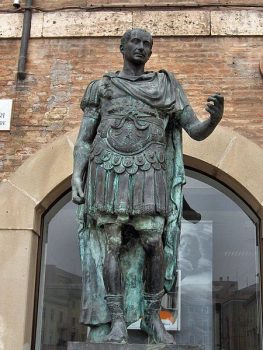Suetonius: Ancient History or Ancient Gossip? Posted by Brittany Britanniae on Feb 1, 2017 in Latin Language, Roman culture, Uncategorized
Salvete Omnes! Today, let’s take a look at some of the most popular and sensational sets of biographries that have survived since the time of the Romans. That would be the 12 books of the De vita Caesarum (literally “About the Life of the Caesars”) compiled and written by Gaius Suetonius Tranquillus, usually known as Suetonius.
Suetonius’ work generating biographies of the Lives of the Twelve Caesars, most probably working with sources from Pliny the Elder, Cluvius Rufus, and letters written by Augustus, is his most remembered endeavor and has interested audiences with its tales of scandal, intrigue, and cruelties for millennia. Even today, his works are still quite popular for those interested in hearing about the personal lives of the most powerful men in Roman history. This popularity has inspired others. Suetonius’ style has inspired biographers across the centuries, possibly including Einhard, the biographer of Charlemagne.
Much more recently we have seen another author inspired by Suetonius and his writings of a certain, commonly overlooked, man: Roman Emperor Claudius. Robert Graves, the author of “I, Claudius” and “Claudius the God”, has said that as he was reading and translating The Twelve Caesars he once had a dream in which Claudius approached him and asked that his story be told. Thus, was born, “I, Claudius”. For fans of the novels or the wonderful BBC series of the same name they must appreciate Graves’ answer to Claudius’ call.
However, besides the sources of Pliny the Elder and actual letters of the Emperor, Suetonius had to derive a considerable portion of his information from word of mouth. Some would even consider his writings to be less a history of the actual men he describes, but more of a history of the intriguing gossip that hovered around them. He has been considered a slanderer by many, but the style of his writing, focusing on the personality traits of each emperor, suggests to others that he was simply studying the men he was researching through the best means available to him.
For today, try your hand at translating some of his quote, from the famous to the simple, yet fascinating details he gives about these men that makes them appear ever so slightly more human:
Life of Augustus:
Cotidiano sermone quaedam frequentius et notabiliter usurpasse eum, litterae ipsius autographae ostentant, in quibus identidem, cum aliquos numquam soluturos significare vult, “ad Kalendas Graecas soluturos” ait; et cum hortatur ferenda esse praesentia, qualiacumque sint: “contenti simus hoc Catone”.
“Some characteristic expressions he used rather frequently in everyday speech can be seen in letters in his own hand, in which he sometimes writes, when he wants to say that certain men will never pay: “they’ll pay on the Greek Kalends.” And when he wants to encourage his addressee to put up with present circumstances whatever they are, he says: “Let us be satisfied with the Cato we have.””
The Life of Tiberius
Praesidibus onerandas tributo provincias suadentibus rescripsit boni pastoris esse tondere pecus, non deglubere.
“He answered some governors who had written to recommend an increase in the burden of provincial taxation, with: “A good shepherd shears his flock; he does not flay them.””
Itaque ne mortuo quidem perinde adfectus est, sed tantum non statim a funere ad negotiorum consuetudinem rediit iustitio longiore inhibito. Quin et Iliensium legatis paulo serius consolantibus, quasi obliterata iam doloris memoria, irridens se quoque respondit vicem eorum dolere, quod egregium civem Hectorem amisissent.
When [his son] Drusus died Tiberius was not greatly concerned, and went back to his usual business almost as soon as the funeral ended, cutting short the period of official mourning; in fact, when a Trojan delegation arrived with condolences somewhat belatedly, Tiberius grinned, having apparently got over his loss, and replied: “May I condole with you, in return, on the death of your eminent fellow-citizen Hector?”
Life of Caligula
Infensus turbae faventi adversus studium suum exclamavit: “Utinam p. R. unam cervicem haberet!”
On one occasion the people cheered the team he opposed; he cried angrily: “I wish all you Romans had only one neck!”
Incitato equo, cuius causa pridie circenses, ne inquietaretur, viciniae silentium per milites indicere solebat, praeter equile marmoreum et praesaepe eburneum praeterque purpurea tegumenta ac monilia e gemmis domum etiam et familiam et supellectilem dedit, quo lautius nomine eius invitati acciperentur; consulatum quoque traditur destinasse.
To prevent Incitatus, his favourite horse, from being disturbed he always picketed the neighbourhood with troops on the day before the races, ordering them to enforce absolute silence. Incitatus owned a marble stable, an ivory stall, purple blankets, and a jewelled collar; also a house, a team of slaves, and furniture – to provide suitable entertainment for guests whom Gaius invited in its name. It is said that he even planned to award Incitatus a consulship.
And, of course, from the Life of Julius Caesar:
Pontico triumpho inter pompae fercula trium verborum praetulit titulum VENI·VIDI·VICI non acta belli significantem sicut ceteris, sed celeriter confecti notam.
“In his Pontic triumph he displayed among the show-pieces of the procession an inscription of but three words, “I came, I saw, I conquered,” not indicating the events of the war, as the others did, but the speed with which it was finished.”
Dein pluribus hostiis caesis, cum litare non posset, introiit curiam spreta religione Spurinnamque irridens et ut falsum arguens, quod sine ulla sua noxa Idus Martiae adessent; quanquam is venisse quidem eas diceret, sed non praeterisse.
“Several victims were then sacrificed, and despite consistently unfavourable omens, he entered the House, deriding Spurinna as a false prophet. “The Ides of March have come,” he said. “Yes, they have come,” replied Spurinna, “but they have not yet gone.””
Atque ita tribus et viginti plagis confossus est uno modo ad primum ictum gemitu sine voce edito, etsi tradiderunt quidam Marco Bruto irruenti dixisse: και συ τέκνον.
“Twenty-three dagger thrusts went home as he stood there. Caesar did not utter a sound after Casca’s blow had drawn a groan from him; though some say that when he saw Marcus Brutus about to deliver the second blow, he reproached him in Greek with: “You, too, my child?””

Build vocabulary, practice pronunciation, and more with Transparent Language Online. Available anytime, anywhere, on any device.






Comments:
JOAN BLAZEBY:
1 SO ENJOY READING ALL YOUR ARTICLES. I AM LEARNING LATIN AT AN OLDER AGE 78. BUT IT IS A CHALLENGE TO ME . ITS ALL THE ENDINGS CONFUSE ME
Brittany Britanniae:
@JOAN BLAZEBY Thank you very much! Picking up a new (or, rather, ancient) language is always a great idea at any time in life. Latin can be challenging, but we wish you all the best in continuing your studies!
Jm:
So interesting – informative. Latin truly makes old meanings new again now in the 21st C. No one can tell me Latin is a dead language . thanks for this blog! So much fun